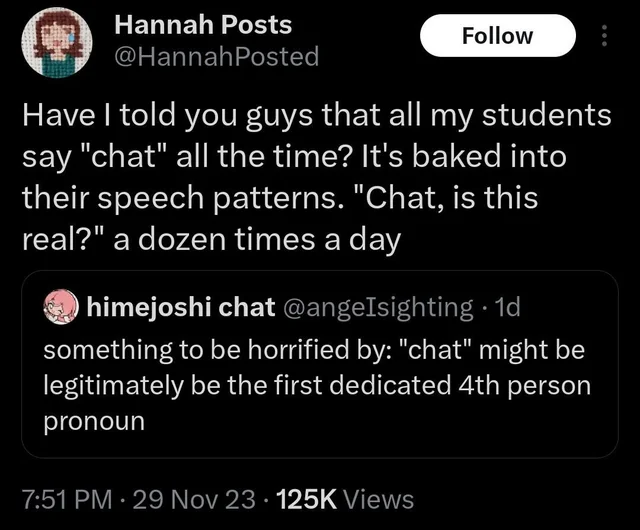this post was submitted on 21 Dec 2023
781 points (95.8% liked)
People Twitter
5228 readers
414 users here now
People tweeting stuff. We allow tweets from anyone.
RULES:
- Mark NSFW content.
- No doxxing people.
- Must be a tweet or similar
- No bullying or international politcs
- Be excellent to each other.
founded 1 year ago
MODERATORS
you are viewing a single comment's thread
view the rest of the comments
view the rest of the comments

Your perspective begs the question, if Standard American English is the "proper" language," how did it become the "proper" language when it didn't even exist 200 years ago? The answer is that language is constantly evolving, and by definition there is no "proper" form of any language. The way Americans speak today is different from 50 years ago, which was different from 100 years ago. The idea of a "proper" form of a language existing is usually imposed by a group seeking to subvert or exert control over other groups, outside of the specific use cases I mentioned before, like professional or academic language. Read this
Here's how I see it:
The English used today is very similar grammatically to the language used 200 years ago, so despite the Wild West days of the US, I think education has done a pretty good job of keeping the language stable. We obviously get new phrases and idioms as culture evolves, but grammar has remained pretty consistent
Here are the historical major events
Then look at English from the 1700s to today, over ~300 years, we've had very few changes in grammar. I guess thee and thou finally fell out of favor, but there's really not many changes, and that's about as long as the period between any of those major events.
"As codified" by who?
Grammar text books.
And who wrote those?
Professors.
And who/what gives them the authority to decide which is the "proper" dialect of a language?